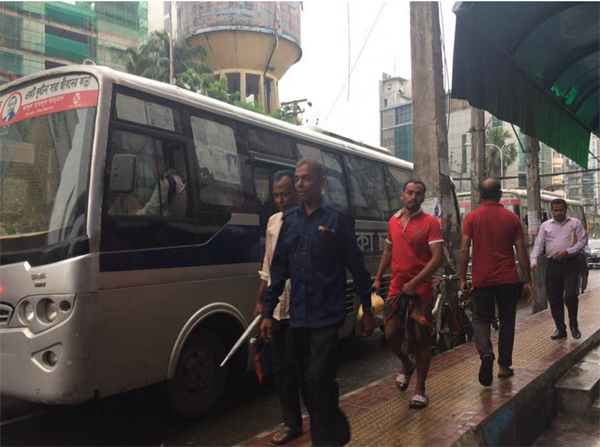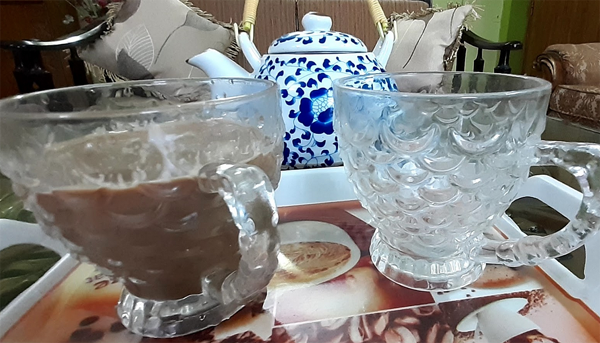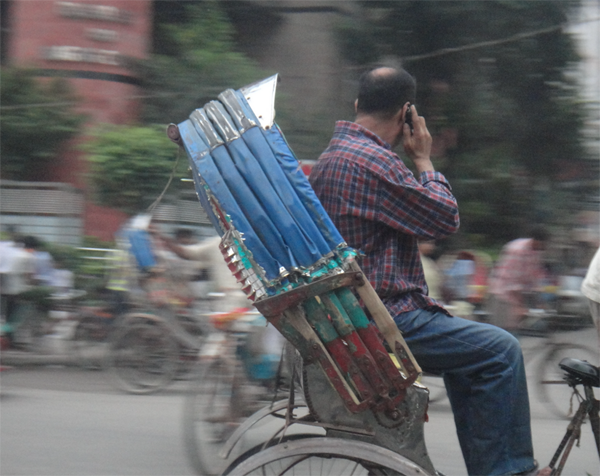Sharing Love
“What are you doing with your mobile phone all the time?”
“I am doing my class, maa.”
“Class? What kind of class is this? Wasting your time on the phone! How can you be doing a class? I don’t see you reading any book!” Ms. Rahela’s voice sounds a little cross.
“It's an online* class, maa. The teacher is taking the class online and we are all connected using our phones.”

Ms. Rahela doesn’t understand what her son, Angkan, is saying. She is sure that he is deceiving her and spending time on his phone and enjoying himself with his friends. She thinks it’s better to do something useful, like earning some money or doing something to help around the house.
Ms. Rahela is a kindergarten school teacher. Sadly, she lost her job during the Covid 19* pandemic*. One day, the principal of her school had called her into the office and said, “It’s not possible for us to pay you anymore. Our students are no longer able to pay their school fees.”
From then on, she has led a very different life. She is alone with her son. Her husband left them a long time ago and married another woman. She has heard that he’s living somewhere in Europe with his new family. He never bothers to call them. Her mother-in-law was with her when Angkan’s father left. After that day the old lady cried and cried and cried about her ungrateful* son. Finally, broken-hearted*, she left this world. The only good thing is that Ms. Rahela doesn’t need to pay the house rent, which is expensive to do in Dhaka city. When he left, her husband had told her,
“You’ll just have to manage by yourself in this house. Don’t wait for me to come back.”
Ms. Rahela never waited for him. She never expected him to return and live with them again. It’s already been seventeen years since he left. Ever since, she has been spending her life with her only son, living as if she is a widow.
Angkan is a very good son. He never complains about anything, and never demands anything that his mother can’t afford. Just after he started university, he began to earn a little money by offering private classes. Nowadays, he never asks about his father. It seems he has accepted life without him. It is only when his friends talk about their own fathers that he feels the pain inside.

Angkan is walking along the pavement*. Suddenly, one of his father’s childhood friends appears. It is Mr. Alaul. He calls out to Ankan loudly.
“Angkan! Angkan!”
Angkan looks up. “Yes, uncle?” he says.
“Your father called me last night. He’s in Dhaka! He wants to meet you. He wants to see how you have grown.”
“Are you joking, uncle?” Angkan can’t believe what he is hearing. His father?...Here in Dhaka? After all this time?
“No, I’m not joking. It’s true!” says Mr Alaul. “All these years he has been calling me to hear news about you. I’ve told you that before. Don’t you believe me?”
“Sure!” says Angkan, but he doesn’t sound convinced. “Well, I guess it’s his home, so he can come anytime*,” he says.
“Baba! As your father’s friend I ask you, please, just take his number, call him. Any time is OK. Just do it whenever you feel like it.”
Mr. Alaul gives Angkan a mobile number. From then on, Angkan doesn’t feel the same as before. Now he knows how to contact his own father. He realises that now he can ask all the questions that have played on his mind for such a long time.
Five days pass. During this time Angkan does nothing but think. Finally, he decides to share the matter with his mother. He decides that he will only talk to his father if she allows it.
“Maa! Maa!” he calls.
“Yes, dear?”
“I have his number now.”
“Whose number?” Who can Angkan be talking about?
“He’s in Bangladesh now! He’s here in Dhaka!”
At last, Ms. Rahela realises who her son is speaking about. She takes a deep breath and tries not to show her son any change in her feelings.
“Who gave it to you?”
“Uncle Alaul. He says that father wants to talk to me.”
Ms. Rahela sighs. “Talk to him, then!” After all these years, she doesn’t really care.
“Won’t you mind?” asks Angkan.
“Why should I? He is your father,” she answers.
“Okay! If you agree, I’ll call and arrange to meet him.”
Though he receives his mother’s consent, Ankan can’t bring himself to make the call.
One day, not long afterwards, Mr. Alaul himself comes to their house.
“Vaabi! I had forgotten the wonderful taste of your tea.” With a smiling face he approaches Ms. Rahela.

“Is he okay, Bhai? Has something bad happened to him?” Ms. Rahela asks about Angkan’s father.
“His visa* expired*! Bangladesh is the only country in which he can stay now.”
“This is his home, and I am just a guest here.” Ms. Rahela is beginning to feel worried. Will she have to leave her home?
“No! No! Don’t worry about that! He’s already told me it’s OK,” says Mr. Alaul.
“And is his new wife with him too?” As Ms. Rahela says this, a silent tear falls from her eyes.
“It’s OK, I understand your pain. All he wants to do is to meet his son,” Mr Alaul explains.
“Angkan! Angkan! Come here” calls Ms. Rahela. “Uncle Alaul wants to tell you something.”
She leaves the two of them together and goes into the kitchen to prepare some tea. After a while, Angkan agrees to have a short conversation with his father using Mr. Alaul’s phone.

From that day on, Angkan notices his mother is making less of an effort to talk to him. It seems she is trying to find something else to do to keep herself busy. He wonders if she feels uncomfortable having to share her son’s love with the man who left her, the man who has completely ignored her feelings. Ah! How painful this feeling must be. Only a mother who has been left on her own can understand it.
“It’s OK, Maa! I won’t ever leave you. I’ll always be here with you.” Angkan tries to make his mother feel safe and secure. He feels as if he has had to grow up very quickly.
His mother sighs*. “You are kind to say that, Angkan. But the truth is, things always change. Now you have your father back again, and one day you’ll have a wife of your own. Just like each of us, you must live your own life.”
Angkan looks at his mother with new eyes. How unselfish* and kind she is. How much he has taken her love and daily care for granted.
“That is true”, he says, with a new gentleness* in his voice. “But you will always be my mother, and I will always be your son. Nothing can ever change that.”
Glossary
anytime - at any time (at no particular time)
bothers - takes the trouble, or makes the effort to do something
Covid 19 - a dangerous disease spread by a virus
expired - finished, ended, reached its end date
gentleness - the quality of being kind and patient
broken-hearted - to have extremely sad feelings that are so strong they can make someone become unwell
kindergarten - preschool or nursery school. A school for very young children
mobile - able to move from place to place
online - on the Internet
pandemic - a disease that spreads across the whole world and affects many thousands of people
pavement - footpath, or sidewalk. The place beside a road where people walk. A pavement has a hard surface, and is often made of stone or concrete
sighs - lets out a long slow breath. People often do this when they are tired or sad.
ungrateful - when people do not feel a sense of thanks for the good things that others do for them, or for the things they have
unselfish - to think of, and care for others before oneself
visa - a legal document that gives someone the right to visit or live in another country
Bangla words
baba – expression used to address one’s father
bhai – expression meaning ‘brother’
vaabi – expression used to address an elder brother’s wife
__________
Learning Activities
Vocabulary
Words from the second 1000 high frequency General Service List

Words from the Academic Word List

Comprehension Questions
- Remembering: What was the reason Ms. Rahela had to stop working as a kindergarten teacher?
- Remembering: Why did Angkan’s father have to return to Bangladesh?
- Understanding: What did Angkan’s father mean when he said “you will have to manage by yourself”?
- Understanding: Why did life become “very different” for Ms. Rahela and Angkan?
Critical Thinking Questions
1. Analysing: In the chart below, write lists of English words and phrases that describe the people in the top boxes. Use some of the words from the story if you wish, but add more of your own. Try to add four or five words and phrases to each box. Use your dictionary if you need to.
Share your lists with other people in your class. In English, say why you have chosen these words and phrases. Are your lists similar to the lists made by other people? In what ways are they different? Which words describe people that you know?
2. Applying: Imagine that you are Angkan. Would you have phoned your father or not? Why/ Why not? What do you think Angkan and his father might have said to each other in that first phone conversation? What would you have said? Explain your ideas in English to a partner. If you have time, write a short dialogue of the phone conversation that Angkan had with his father the first time they spoke. Rehearse and perform your dialogue to others in your class.
3. Evaluating: Angkan’s mother tells him, “you must live your own life”. What do you think she means? In what ways is it a good thing to ‘live your own life?’ In what ways might it be understood to be a bad thing? When is it important to consider others, especially your family members, when you make life decisions? Is it ever OK to put yourself and your own wishes first? Explain your ideas in English to your classmates and give some reasons for your opinions.
4. Creating: Which person in your life has given you the greatest care, and/or has shown you a fine example of unselfishness? Think about what that person has done for you, or the example they have shown. Write that person a letter in English, and thank them for their care and/or their example of unselfishness. Explain why you are writing, and what, exactly, you are grateful for. Be specific. If that person can read English, share your letter with them. If not, you could translate it, and then share it.